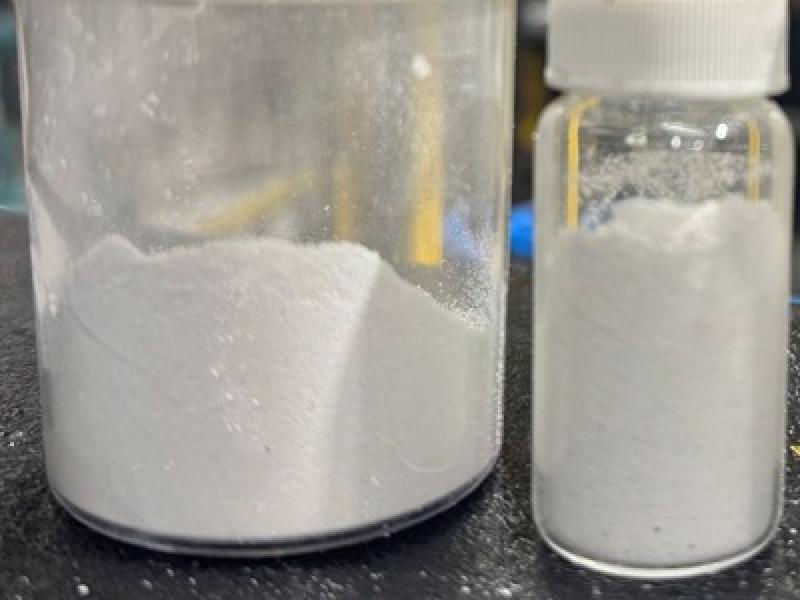
A US$18-million investment into Calgary-based Carbon Upcycling will support a partnership with European building materials maker Titan Group and a “flagship commercial project” in Ontario, propelling the company to its goal of commercializing a low-carbon concrete ingredient.
Led by Builders Vision, an environment-focused investment group, the funding will allow Carbon Upcycling to deliver on upcoming tests at two of Titan’s cement facilities in Greece and the U.S., plus continue its commercial pilot at the Ash Grove Mississauga Cement Plant.
The funding reaffirms “the support that the syndicate of investors that are already in Carbon Upcycling continue to have for the company,” Carbon Upcycling's co-founder and CEO Apoorv Sinha said in an interview with Sustainable Biz Canada.
The company has devised a process that takes local industrial wastes such as steel slag, ashes and mine tailings and turns them into a supplementary cementitious material (SCM), which can partially substitute carbon-intensive cement used to make concrete. The new materials are used as a medium for trapping carbon dioxide (CO2).
By using the residues, Sinha said Carbon Upcycling is economically competitive and good for the environment. It reduces waste and sequesters between 20 to 30 kilograms of CO2 per tonne of SCM to as much as 150 to 200 kilograms per tonne, depending on the feedstock.
The Titan partnership
A major cement producer with 16 factories in Europe and the U.S., Titan signed a memorandum of agreement in early June with Carbon Upcycling, where the Canadian company will hold feasibility studies of its process at two of Titan’s cement plants.
The partnership will have Carbon Upcycling “essentially try to look at how we can help Titan better use some of the local feedstocks that they have available in these regions and produce a lower-carbon, high-performing final cementitious product for their customers,” Sinha summarized.
Each facility produces the industry average of one million to 1.5 million tonnes of cement per year, Sinha said, and the studies will start by using mine tailing-based SCMs for between 10 to 15 per cent of the production. Then the intent is to raise that figure over time.
Uncovering two metrics will be central to the agreement: how cost-competitive Carbon Upcycling’s technology is compared to limestone kilns, and showing whether Carbon Upcycling’s all-electric process can result in a 70 to 80 per cent smaller carbon footprint compared to Titan’s conventional cement production.
The agreement laid out a road map for the next two years, which could take longer for completion — until 2029 or 2030, Sinha said.
The partnership will be starting with the initial two cement plants, with the end goal of impacting the entire portfolio of Titan’s cement-producing facilities. Sinha is “absolutely confident” the Titan partnership has long-term potential. By demonstrating to Titan its technology works, it will also show Carbon Upcycling can execute larger projects in different geographies, he said.
'Flagship' Mississauga project
As it engages with Titan, Carbon Upcycling’s flagship project is also progressing. In Mississauga, the company plans to display it can fully integrate its technology into an operating cement plant.
Referred to by Sinha as the company’s blueprint for future projects with cement partners, Carbon Upcycling is partnering with Ash Grove to take steel slag from a nearby manufacturing site and produce approximately 32,000 tonnes of SCM per year, storing away 3,000 tonnes of CO2.
The plan is to have Carbon Upcycling operating at the Ash Grove Mississauga Cement Plant by the first half of 2026.
Sinha’s target is to grow Carbon Upcycling to the point where it will be on the way to install equipment with the capacity of producing two to four million tonnes of SCM by the end of 2030.
The company currently has a pipeline of 15 to 20 projects to meet this ambition – approximately half will need to be executed on to get near the four million tonnes target, Sinha said.
Policies that encourage the use of SCM will be crucial to pave a smooth road for this aspiration, he said.
“It is really important that domestic supply chains are being prioritized”, to cut dependency on international supply chains, Sinha said.










